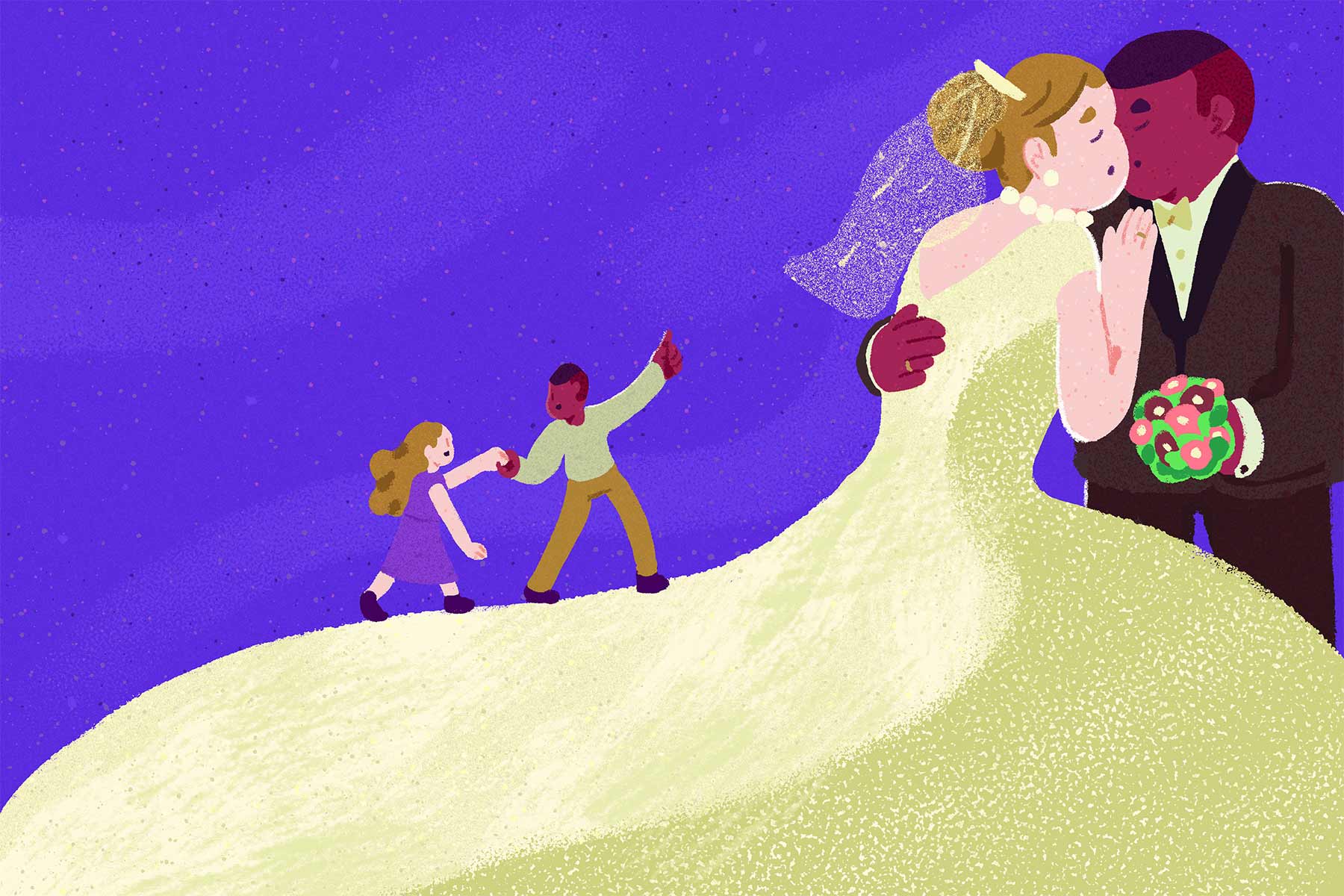It was a brisk November night in a central London nightclub when I first saw my husband’s dimples. I was a grad student in my early twenties, and I had on a baby-blue discount T-shirt dress and bright-red lipstick from the drugstore. I was my flatmate’s plus one at a place known as the West End’s closest thing to Rio. Fortified with liquid courage from a caipirinha, I hit the dance floor.
A casually dressed man with a freshly shaved fade in his Afro hair made his way through the crowd with a few casual hip swivels. He grooved his way toward me. The disco lights flashed across his face, highlighting the deep dimples piercing both of his cheeks. His skin was smooth and clean shaven. He flashed a smile and offered me his hand to dance. He radiated kindness. How could I say no?
Uncoordinated and awkward, I stumbled over his feet while he coached me through the side-to-side steps of a dance called forró. The dance complements the traditional folk music of the same name from Brazil’s northeast. An accordion plays the melody, a bass drum holds the beat, and the gentle clang of a metal triangle accents it all. The dance requires a deep embrace between partners, so he pulled me closer. His confidence was contagious. He smiled warmly as we danced and he sang along to the music. After a few songs, we shuffled off the dance floor and perched ourselves at one of the cocktail tables to have a beer and a chat.
He didn’t speak English. I knew no words in Portuguese. This was before smartphones became ubiquitous. There wasn’t an app that could help us. My Belgian flatmate spoke Brazilian Portuguese, and she translated as best she could over the blaring samba music in our dimly lit corner of the club. He reached into his pocket and passed me his flip phone over the top of our open beer bottles.
“HE WANTS YOUR NUMBER!” my flatmate shouted into my ear.
I had noticed him early in the night. He was hard to miss. He was dancing with a woman. And then another. And then another.
“YOU’VE BEEN DANCING WITH EVERYONE IN HERE,” I said with a smirk, looking him in the eye while my flatmate translated.
“JUST BECAUSE I’M DANCING WITH SOMEONE DOESN’T MEAN I’M GOING TO MARRY THEM,” he quipped in Portuguese.
Fair point. I punched my number into his flip phone, expecting nothing. I didn’t know I was changing my fate by keying in my digits.
Neither of us knew we were about to embark on a journey across countries and cultures—sometimes joyous and other times frustratingly complicated. I wasn’t prepared for a years-long mission through bureaucratic hoops and cross-national hurdles to have our love legally recognized. I didn’t know that, in a year and a half, I would be drowning in non-stop paperwork just to be with the person I loved.
Afew weeks after we met in the nightclub, he called to ask me out.
“We go to the cinema?” he asked. His delivery was wooden, as if he had rehearsed his words and was reading off a piece of paper.
“Um, I’m about to get on the tube. My phone’s breaking up. I think I might lose you,” I replied, quickly snapping shut my flip phone, not knowing what else to do. How could we communicate with each other? It seemed like a major barrier for a date.
After I declined a few cordial invites to the movies, he gave up.
After a year without contact, he texted me again. “How are you?”
He said he still remembered my red lips, and he still wanted to go out on a date. I remembered his dimples. I admired his persistence, and I decided to give him a shot.
By then, it was 2010, and it was the coldest January the UK had experienced in decades. The nation was blanketed in an unusual amount of snow, and it wreaked havoc on roads and public transportation across the country.
I had low expectations of our date. I actually planned an intervention in advance. After he and I got to know each other, my then flatmate was going to swing by—just in case I really needed saving.
I went into the date with many assumptions. My memory of us meeting at the nightclub was vivid, but details were starting to fade. Remembering his smooth skin, I assumed he was much younger than me. I was expecting his English to still be poor and that the date would mostly be us awkwardly sipping our drinks while failing to talk to each other. When we met, neither ended up being true.
A week after receiving his text, we met at Camden Town tube station to go for a drink. He was wearing the same black puffy coat he had on the first night we met over a year ago. His once neatly trimmed fade had grown out into a stylish Afro. We couldn’t walk more than a few steps without a passerby complimenting his hair. With every compliment, he’d react with a coy, closed-mouth grin, and a hint of his dimples would dent his cheeks. The unsolicited attention would make him look away, almost in embarrassment, but his humbleness only made him more attractive to me.
We reached the corner of Camden High Street. He spotted a Victorian pub, held the door open, and we ducked inside. His English had vastly improved, and our conversation flowed as easily as the beer from the taps. Our bar stools inched closer together while we sipped our pints of Guinness.
When my flatmate showed up to intervene, I waved her off. It wasn’t needed.
His name was Sandro. And I was falling in love.
By May, we had been dating for several months. On our dates, we would get lost in hours of winding conversations, and he was slowly trying to teach me Portuguese. Being with someone from another culture and country isn’t for the faint of heart. It’s a lifetime of uncomfortable experiences, and you have to be comfortable enough with yourself to want to go on this ride. Language barriers and opaque nuances will always exist. You’ll never fully have the institutional knowledge of the other person’s culture because you weren’t always there. No matter how close you get, your lived experiences—sometimes more extreme than others—will always be a gulf that will never fully close. But spending your life learning about a different culture and perspective is the most enriching gift anyone can give or receive.
He told me he had to go back to Brazil. On one of his last days in London, we lay on the manicured grass in Regent’s Park.
“You know, you can always be a journalist in São Paulo,” he said to me.
I thought it was his sweet way of inviting me on an adventure together. But for him, a shy introvert, it was his roundabout way of asking us to merge our lives together permanently. He was inviting me to combine our lives in his megacity home. At the time, I was young enough to feel invincible. I was already living in the UK, after a previous stint in another country. What was another move, really? And moving to Brazil . . . how hard could it be?
Over the next eight months, the paper chase began while I was still living in London. How was I going to get a visa to move to Brazil?! It was a necessary document for us to be together. For our relationship to survive. Depending on your nationality, the country you want to move to, and the type of visa you want to get, the process can be costly, time consuming, and complicated.
All the Brazilians I met warned me about their country’s bureaucracy, that it was intentionally designed to be difficult. I was once told that, when Portuguese settlers arrived, the bureaucracy was designed to be confusing so the local Indigenous population and enslaved Africans couldn’t navigate it. To this day, the country’s famous red tape adds to an unequal society that’s still divided along racial lines.
Getting a visa so I could live in Brazil legally ended up consuming most of my waking thoughts. I needed a work visa, and in order to get that, I’d need a full-time job and a company to sponsor me. I had neither.
I shared my experience of going through a bureaucratic maze, filled with roadblocks and dead ends, with just about anyone—whether they wanted to listen or not. It seemed like there was always another document to produce or another stamp to get. After months, I somehow managed to secure a one-year media visa that would allow me to work as a foreign correspondent in Brazil.
In 2011, I left Heathrow on a one-way ticket to São Paulo. I wasn’t prepared for the culture shock. I boarded the plane on an overcast winter’s day in London, and when I landed, I felt the muggy summer air of São Paulo on my skin. The line to get through immigration snaked around the brightly lit passport control area. It was a busy time of year, with the usual influx of tourists flocking to Brazil for the annual carnival celebrations. For hours, I inched forward, waiting my turn.
“Próximo!” Next! A member of Brazil’s federal police waved me over to her window. With an official stamp in my passport, the clock officially started ticking on my visa. We had to organize our marriage paperwork immediately or I’d run the risk of having to leave the country. We knew that getting a marriage licence would take months, so we had no time to spare. My rush to the altar had begun.
My naivety and lack of life experience could have been masked as bravery. Before moving to São Paulo, I heavily researched Brazil. I wanted to be prepared to take such a big leap. I saved as much money as I could. I took part in a language exchange with a Brazilian friend to learn basic Portuguese. I even studied maps of the neighbourhood I’d be living in. But no amount of googling prepared me for the culture shock of moving to a country that I had only ever visited online.
São Paulo is a city bursting at the seams. Over 20 million people live in its greater metropolitan area, a population that weighs heavily on the region’s crumbling infrastructure. The multicultural megacity was messily stitched together with the promise of a future for all and the disappointment of opportunity only for a few. On most days, the sea of high rises and the endless concrete landscapes felt suffocating. Most people were on alert and in survival mode. Being a victim of an armed robbery, a home invasion, or a carjacking was incredibly common. Daily life was a hustle, and no aspect of it was ever straightforward. This made planning a wedding on a compressed timeline that much more complicated and stressful.
My first trip to Sandro’s favela was eye opening. The tiny makeshift homes in the south zone of São Paulo squeezed in more people than I ever could have imagined. Sandro’s entire family home wasn’t much bigger than the kitchen in my middle-class Canadian childhood house.
During my early days in Brazil, every trip to the favela was uncomfortable. I didn’t have to look to feel the stares. I didn’t have to speak Portuguese to understand the whispers. I was obviously an outsider. I felt like I was walking down the street in a Big Bird costume. It helped me understand how Sandro must feel when he’s in predominantly white spaces in Brazil, Canada, or elsewhere.
After a few months, there was a breakthrough. “I like Sheena,” his mother casually said while cooking beans on top of the stove. I could barely understand her over the steam hissing out of the pressure cooker and with my still-poor grasp of Brazilian Portuguese. But with those words of approval, thoughts of any frosty reception quickly melted away.
The process of getting married was overwhelming. Documents had to be translated and verified. There was always another piece of paper to get. Every time I’d ask about the right steps to take, I’d get a different answer. Going to the cartório, a Brazilian registrar’s office, became a near-daily occurrence. I’d always leave more confused than when I arrived. Some processes just didn’t make sense to me, like notarizing every single page in my passport—including the blank ones.
With every redundant visit to the cartório, I started to develop a physiological reaction to the stress of Brazilian bureaucracy. Every visit felt like someone was yanking on the tendons on the right side of my neck. I’d almost always leave frustrated. It would take me days to recover. Choking through my grammatically incorrect Portuguese was mentally exhausting. Trying to figure out the processes was painfully confusing. Nothing ever got solved in just one trip. It felt like I was trying to find a solution to a problem that would never end.
After another half a year of us both chasing papers, I finally felt we had the documents we needed to get married.
On a hot and humid spring day in October, almost three years after we met, I went alone to our local cartório to schedule our wedding. I was excited to set the date. I had all my documents ready in my plastic file folder.
“Boa tarde.” Good afternoon, I said to the public servant working at the front desk, as I neatly laid out our stacks of paperwork.
He thumbed his way through the documents and photocopies. His facial expression changed from a furrowed brow to a long, blank stare.
“You’re missing a document,” he said.
“What is the document exactly?” I asked.
He said I just had to trust his word.
That yanking sensation in my neck intensified, and it started to feel as if someone was pulling out my throat. My eye twitched, and I collapsed into a hyperventilating sob. Through my hysterical crying, I managed to get my fiancé on the phone. As I wept, a different, kinder man emerged from the back room, a box of Kleenex in his perfectly manicured hand, and he attempted to console me. All the Brazilians waiting with their own folders full of documents stared on, watching my meltdown.
More than an hour later—and with no new documents provided—I was told we had everything we needed after all. My fiancé, who was a lawyer, had double-checked the law for the worker at the cartório, saving us from jumping through another redundant bureaucratic hoop.
A few weeks later, our wedding day arrived. Three years almost to the day we had first met, dressed in a tuxedo and a wedding gown, we stepped into that same no-frills registrar’s office for our wedding.
Sealed with a kiss, we married into another stage of paperwork.





